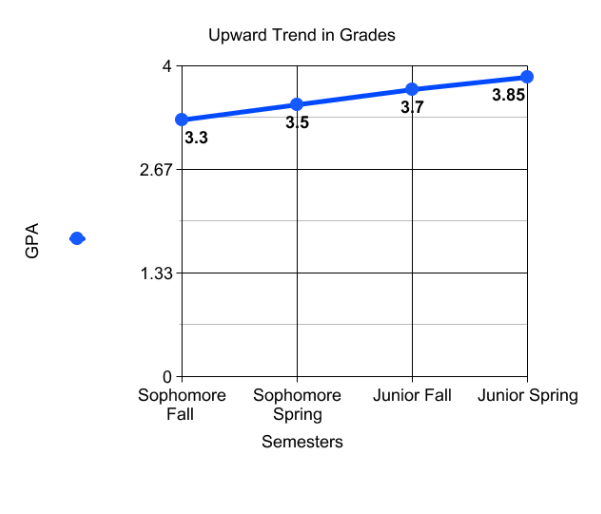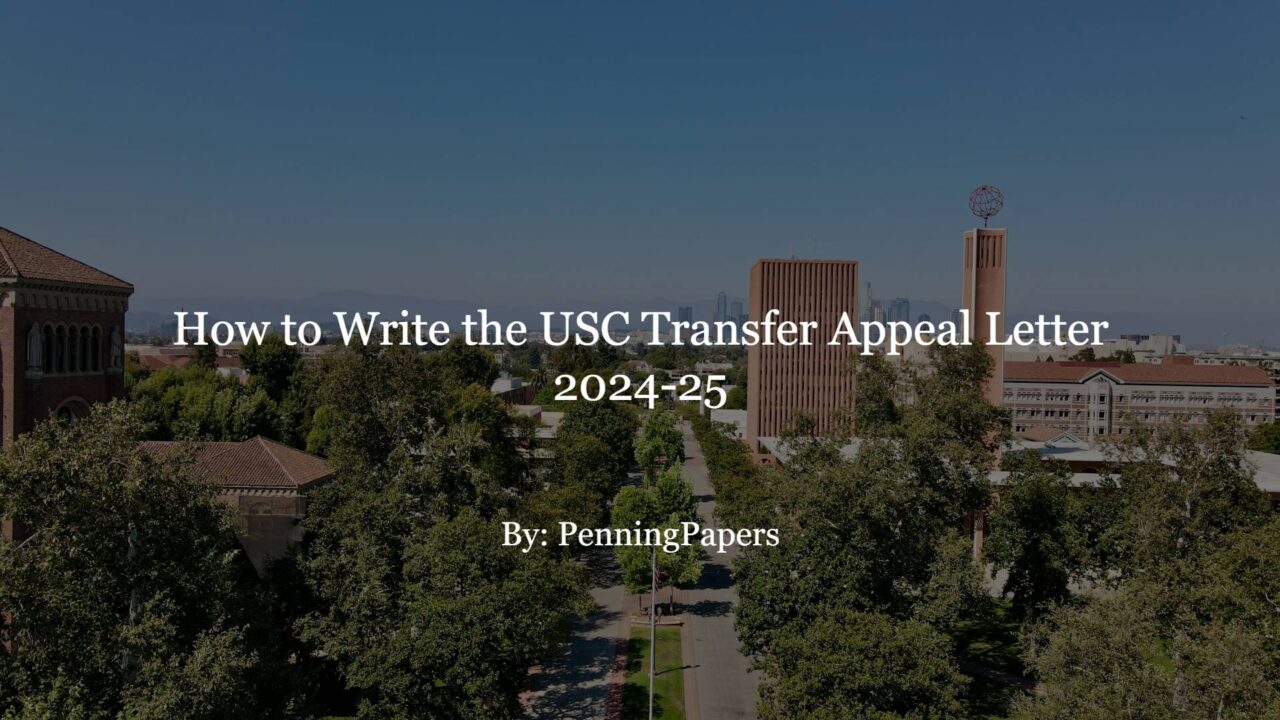The USC transfer appeal process is vague. There aren’t many resources talking about it, including the school’s official website.
As such, we recommend treading lightly when researching online. Many online articles and forums discussing the USC transfer appeal letter are limited to arbitrary conjecture.
To make things harder, USC seldom ever accepts transfer appeals.
Most school rejections are just that: rejections. After all, they’ve sorted through your application with a fine-tooth comb. So, the chances they’ll change their minds are slim!
In fact, USC used to lack a formal appeal process for transfer applicants! It was only last year in 2023 that a formal appeal process was implemented for transfers. You can find it in your USC applicant portal below the “Appeal of Admission Decision” section.

We’ve also pasted USC’s formal transfer appeal process below.

To appeal USC’s transfer decision, you must submit the following items via the USC application portal.
- A one-page statement explaining why you wish to appeal. USC is most interested in new and compelling information not already stated in your original application.
- Spring of 2023 term grades uploaded through an unofficial transcript (if you have not done so already.)
Because USC now has a formal process compared to previous years, we can infer they’re taking appeals more seriously. Thus, there’s no excuse to write a low-quality appeal letter. Writing an appeal letter that stands out is crucial.
With that, let’s get right to it.
Professional College Application Help.
Contact us. We'll get to you within 24 hours.
Table of Contents
- Essential Rules for Writing the USC Transfer Appeal Letter.
- What Topic Should I Write About in the USC Transfer Appeal Letter?
Essential Rules for Writing the USC Transfer Appeal Letter.

These rules are critical to writing a proper appeal letter to USC.
Despite USC not providing very specific rules dictating how you write the letter, it helps to follow the basic appeal letter format conventions. We also answer some common questions regarding the appeal letter below that are worth considering.
When is the USC Transfer Appeal Deadline?

Note: this section has been updated as of May of 2024
You must submit your transfer appeal within 2 weeks of receiving your decision. Decisions are released May 31st. Therefore, USC’s transfer appeal deadline is June 14.
Remember: the rules for USC’s transfer appeal are not as solidified as its regular decision appeal process. Thus, submitting early is important.
Here’s our general recommended writing timeline.
- Finish the transfer appeal process on time, use 7 days.
- 5 days (about 1 hour each) will be spent writing and completing the transfer appeal letter.
- The final two days will give space before the deadline in case you need to make any last-minute changes.
Formatting, Spacing, Tricks, etc.

When writing the appeal letter, and practically any appeal letter at that, you generally want to stick to 1 page’s worth of writing.
Here at PenningPapers, we’ve been asked whether one could use formatting tricks. This includes changing the spacing a bit, minimizing the font size, changing the font into something like Arial instead of Times New Roman, changing the margins into something smaller than 1″, etc.
Generally, we want to avoid doing this. However, college admissions processes are seldom black and white. There are occasionally exceptions to the rules.
What Am I Allowed to Write About?

Although there is no hard rule against writing about tragedy, we recommend being very careful about talking about tragedies. It’s not to say that they’re wrong. Rather, it’s important that you write your appeal letter without sounding like you’re capitalizing on negative events.
Here’s an example.
Let’s say, during junior and senior year, there has been a major tragedy that made your academic performance spiral out of control. It’s important to present your information in a manner that doesn’t make it look like you’re grasping for straws or guilt tripping your admissions officers.
They’re smart! And, it’s often to students’ disadvantage that they believe they can “trick” their readers into feeling sorry for them.
Thus, it would be important to demonstrate HOW the tragedy influenced your performance in the past and therefore WHY that demonstrates you’re still a strong candidate. You need to follow through with the logical thought process and not just assume the admissions officers would take pity on you. What was the event? Why is it important? How does that actually show you’re a suitable candidate for the USC admissions office?
If you’re not sure whether you’re writing about your experiences properly, you may want to consider speaking with a college admissions advisor and editor. Here at PenningPapers, we offer a free 30-minute consultation where we can brainstorm ideas and check to see if your ideas will work!
How Formal Must I Be?

As we mentioned previously, USC does not have as many formal rules for its transfer appeal process.
Despite the school having revamped its transfer appeal process this year, they only really say that they are “most interested in new and compelling information that was not a part of your original application.”
However, it is no reason to write the appeal letter informally. So, that means using proper language without slang, grammatical mistakes, or unusual phrases and sentence structure.
You should also consider thanking the admissions officer for reading your appeal. After all, they are taking the time out of their day to reconsider your application which they already made a decision on!
One of the weird things about formality is that it can even show through your use of advanced vocabulary. Don’t be too gratuitous in vocabulary for the sake of sounding smart. This can be necessarily obscuring and appear like posturing. The admissions officers aren’t there to stroke egos; they just want a clearly articulated answer.
Some Important Information Regarding USC’s Transfer Appeal Acceptance Rate

Most students have a very slim chance of acceptance off of USC’s transfer appeal process. But, before you ask, your chances are not 0. You still have a shot.
While USC doesn’t publish exact appeal numbers on their Common Data Set, they’ve stated (in the FAQ section of your rejection letter) that approximately 2,000 students sign up for appeal. Only 30-50 are accepted.
That makes USC’s appeal stats between 1.5%-2.5%.
However, don’t lose hope: this rate fluctuates every year.
First, USC has had some —ahem— unusual transfer appeal rates that were unusual to say the least.
In particular, some years were weirdly generous. Meanwhile, others were brutal. Why some years are more generous than others is unknown. But, the chance of getting a “good year” make the appeal process worth it.
For more information regarding this phenomenon, check out section 3 of our article on UT’s weird appeal process.
Additionally, USC’s abysmal transfer appeal rate isn’t as daunting as it seems. Based on the many letters we’ve reviewed, most students’ appeal letters are poorly-written. In fact, many don’t have new or compelling information to qualify for grounds for appeal! Just by having a solid topic, you beat out a good chunk of the competition!
For more information on that matter, you can check out the beginning of our UC Berkeley appeal letter guide, where we cover this in depth.
What Topic Should I Write About in the USC Transfer Appeal Letter?

Coming up with a topic worth writing about can be a challenge, especially since the instructions for writing the USC transfer appeal letter are rather vague on USC’s website.
Below, you’ll find some of our recommended methods for coming up with topics for your appeal.
But, before you jump right in, please consider this: most people think they don’t have anything to write about in their appeal letter. In reality, we found that most of our clients had perfectly good reasons and topics to write for their appeal. They just needed to get creative.
Look Through Your Submitted Application for Insufficiencies. (Process of Elimination).

One of the best ways to find topics to write about in your USC transfer appeal letter is to dig through your application.
You should approach this from a process of elimination perspective. There are certain aspects of your application that may be insufficient and have left a dent in your acceptance rate. List these out and make a clear assessment as to how much of an impact it may have had on your rejection.
Not every insufficiency is grounds for a topic. For instance, an applicant with a 3.95 unweighted GPA is likely rejected for reasons outside of academic performance. Instead, there may have been other insufficiencies that got in the way.
Here is a convenient list for you to go through when sifting through your old application. Use this list to see where you may have weaknesses.
- GPA
- AP / IB Courses
- Unusual dips in academic performance
- Extracurricular activities
- Events or Achievements made during extracurricular activities
- Notable honors or awards.
- Leadership positions
- Things done in leadership positions
- Recommendation letters
- Essay quality
- Red flags in your essay
- Signs of cheating / having a fake club or activity for the sake of gaming the admissions process.
We’ve bolded 1, 3, 10, 11, and 12 because these are the most common and reasonable answers to put in your appeal letter. Then, write about the insufficiencies and how you’ve come to patch or compensate for them.
If you are unsure about what to write about or how specifically to write the topics in your USC transfer appeal letter, don’t be afraid to ask us for help! At PenningPapers, you can schedule a free 30-minute phone consultation for advice. We’ll get back to you in 24 hours and help you incorporate your topic to stand out.
New and Compelling Information.

This section parallels what we mentioned earlier.
Roughly speaking, don’t “game the system” by grabbing at tragedies to guilt trip admissions officers. Instead, be honest and forthright about why you belong at USC. All info in your USC transfer appeal letter should be new and compelling.
Note: this doesn’t mean you can’t qualify information on your previous experiences or academic performance. While you shouldn’t just repeat what’s in your last application, you can still show your previous information in a new light and perspective.
Let’s look at an example.
Let’s say you started your Sophomore year with a 3.3 and a 3.5 GPA; then, you increased your GPA during junior year to a 3.7 and a 3.85.

You can talk about how you developed the proper academic study skills needed to apply your knowledge to a classroom setting. The admissions officers may see your academic performance, but they may not have considered the work it took to increase your grades and adapt to the classroom environment.
This paints a better picture of how you could still be a great fit for the school. It shows more in-depth detail about your performance past numbers, giving your readers a holistic perspective.
There are other reasons why you may still believe you belong.
Maybe the admissions officers made a mistake in your application and rejected the wrong person. For example, USC sent the rejection to your email; but, they sent the email to the wrong person.
If however there were any unusual circumstances that would normally make the admissions officers change their opinion on your application such as issues with the transcript grades or issues with the letters of recommendation, you may consider writing about that. Those can often be difficult to describe, so don’t be afraid of using more words! Be specific in your description!
HOW Does Your New Info Make USC MANDATORY To You? Why is it a Good Fit?

Fit is one of the most important elements of your USC transfer appeal letter.
More often than not, only students who are great fits for USC’s incoming class match. This is because they happened to be students who USC didn’t categorically have.
Anything along the lines of “really wanting to be a Trojan” is not good enough. You need to have a truly reasonable point on why you MUST attend USC.
From what we’ve seen, the best essays include content related to major and career. This is especially true if there are personal reasons for the selected major of interest.
Here’s an example.
- You want to major in Business Administration, but you also find Psychology fascinating.
- No other schools have the same level of interdisciplinary collaboration.
- You plan to combine Business and Psych to conduct a new business helping child development in educational psychology. Thus, you require the resources at USC because their startup environment and collaborative culture are critical to your success.
- Your improved grades demonstrate you can handle this responsibility.
Notice how in these points we demonstrate how USC is critical to your future?
Also, this list shows that your acceptance to USC isn’t just about you. It’s also about helping others.
Thus, your vision is tied to USC’s decision. Your USC transfer appeal letter becomes not just something to benefit you alone, but a force for good that benefits the community under USC’s banners.
If you have any other questions about writing the USC transfer appeal letter, or if you don’t know where to start and are looking for some guidance on how to stand out, contact us for a free 30-minute phone consultation! We will get back to you within 24 hours to discuss the best methods for you to stand out in the appeal process based on your background.

